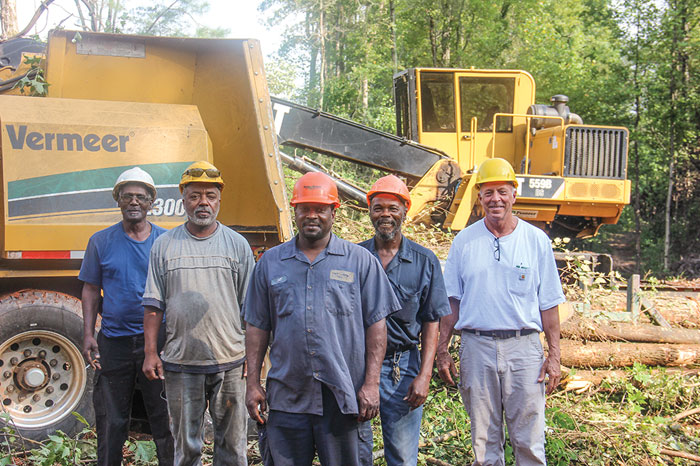After a seven-year hiatus, Deck Trevitt not only returned to conventional logging in early 2014, but in the latter part of the year added a chipper to his operation and today provides fuel chips to three markets in Georgia, including the new Piedmont Green Power biomass plant in Barnesville, Ga.
When Trevitt decided to leave the logging business in 2007 he wasn’t sure if he would ever return to the hands-on aspect of it. Trevitt, 63, a graduate of Mercer University, started Trevitt Logging in 1978 and later changed the name to Quality Forest Products to indicate the business was about more than just cutting trees. He quickly gained a reputation as one of the most innovative loggers in the Southeast and was twice honored as Georgia’s Logger of the Year (1986 and 1997) as well as Timber Harvesting magazine’s Logging Business of the Year in 2001. Trevitt was one of the first loggers to serve on the American Pulpwood Assn.’s Board of Directors.
In 1999, Trevitt turned some heads in the Southern ranks by converting one of his three logging crews into a cut-to-length operation to merchandise a growing number of log sorts more efficiently. CTL had its advantages and disadvantages for Trevitt. Many potential clients were unfamiliar with the logging system so they didn’t understand the benefits. Others were willing to make price concessions for it because they understood CTL aesthetics and environmental benefits. One pitfall Trevitt had not counted on was the way underbrush hindered CTL productivity. Trevitt had to assign a third member to the crew whose job was cutting brush and small saplings with a brush saw. While production improved, the extra expense proved costly.
In the 1980s, Trevitt was one of the first in the region to use on-board scales in order to keep load weights in legal check. He also explored ways to make trucking more efficient by using special order trucks and lightweight trailers equipped with super single rear tires. In the late ’80s, Trevitt made efforts to improve trucking efficiency by eliminating more than 2,000 lbs. in tare weight. Many of the concepts he came up with became standard trucking specs.

The crew goes back nearly 30 years with Trevitt; left to right, Isiah Gibson, Ed Singleton, Jeffery Alexander, Schyulor Fields and Trevitt
Here And Now
For much of the 2000s, Trevitt was managing three crews in Georgia and then he decided it was time for a change. Trevitt was starting to grow weary of all the responsibilities that came with managing multiple crews so in 2006-2007 he sold each of the crews to the guys that were running them. Trevitt and Quality Forest Products continued to operate as a timber dealer and timber buyer contracting with those three crews.
But that setup would change. One of the crew owners was from northern Minnesota and he returned home and took his CTL operation with him. One of the contractors decided there was somewhere better to log other than Quality Forest Products and the third operation couldn’t make a go of it. Quality Forest Products hired other contractors to replace the lost ones, Trevitt recalls, but as the recession wound down the number of loggers began to dwindle and it was tough to find good contractors. “All the contractors we’ve had are excellent contractors,” Trevitt says. “Sometimes things just don’t work out.”
Trevitt learned a lot during this period. “We were somewhat spoiled when we did all of our own logging because we owned the equipment and had the manpower,” he says. “When we got out of the logging business we lost some control over the quality of the work we were able to do and it’s a lot easier to get the quality work that we want by doing it ourselves. That’s the biggest advantage of being in the logging business. When you tell a man you can do something, you can do it. When you tell a landowner you can do something, you can do it.”
In January 2014, when an opportunity came up to buy some used equipment, Trevitt became a logger again. A company-owned logging operation was looking to shut down and Quality Forest Products bought everything they had. Trevitt named his new logging operation, Woodland Improvements, serving as a contractor for Quality Forest Products, along with four other contract jobs.